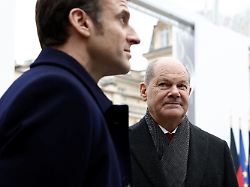Chancellor says “Merci” to Paris
Scholz and Macron conjure up a new era in the EU
1/22/2023 3:26 p.m
On the 60th anniversary of the Franco-German friendship treaty, Chancellor Scholz and President Macron acknowledged the EU’s enormous need for reform. Neither of them want to know anything about an ice age between Paris and Berlin. The duo is a well-oiled compromise machine.
Chancellor Olaf Scholz and French President Emmanuel Macron are calling for the EU to play a more confident role in the world. “We may be facing an even greater turning point. A turning point towards a multipolar world that we cannot face by retreating into our national snail shell,” said Scholz in Paris in the afternoon at the commemoration of the 60th anniversary of the Franco-German friendship treaty (Elysée Treaty). One can no longer afford “a small, despondent Europe” that indulges in national egoism and opens up rifts between East and West, North and South.
Scholz thanked France for his friendship. “Thank you, Mr President – thank you from the bottom of my heart,” said the SPD politician in French to Head of State Macron. He also thanked the French: “Thank you, our French brothers and sisters, for your friendship,” said Scholz in French at a ceremony in the parliaments of both countries. Scholz and Macron emphasized to strong applause that the EU would continue to support Ukraine against the Russian attacker. “Putin’s imperialism will not win,” said Scholz.
The cabinets and parliaments of both countries came together in Paris to celebrate the anniversary. Macron demanded that Germany and France should be pioneers in the reestablishment of Europe. He pointed out that at a meeting in Versailles last March, the EU had already resolved to reduce strategic dependencies in the areas of energy, the military and food. But there is still a lot to do. The Chancellor referred to the necessary expansion of the EU and the need to reduce the right to veto decisions within the Union.
No sweet cuddles, no empty symbolism
Macron and Scholz also mentioned the European recovery fund with a volume of 750 billion euros, which had been agreed to overcome the consequences of the corona pandemic. With a view to the French call for a new solidarity fund to be added, the French President added that the EU was responsible “for our decisions that we make and our decisions that we don’t make”. Scholz has reservations about a new fund and only a few days ago pointed out that only 20 percent of the amount in the solidarity fund had been paid out at all.
The Chancellor also downplayed differences between Paris and Berlin on a number of issues. “The Franco-German engine is a compromise machine – well oiled, but sometimes loud and marked by hard work,” he emphasized. “He doesn’t get his drive from sweet cuddles and empty symbolism. But from our firm will to repeatedly convert controversies and differences of interest into aligned actions.”
Poland warns against Franco-German claims to leadership
It is normal that there are always differences between the two countries due to different political and economic structures and other historical experiences, the Chancellor added, referring to differences of opinion, for example in EU financial and industrial policy. This is precisely why solutions are also acceptable for others in the EU. “Only with the other at our side – as a friend and closest partner, as a couple fraternel – does our own country have a good future.”
The reconciliation between the two countries after the Second World War was praised in several speeches at a ceremony at the Sorbonne University in Paris. A few days ago in Berlin, the Polish Prime Minister Mateusz Morawiecki warned that two countries wanted to lead the EU. The Franco-German Council of Ministers was actually supposed to take place last autumn, but had been postponed. The federal government has only agreed to meet the entire cabinets of both countries with France. With the exception of Labor Minister Hubertus Heil, the entire federal cabinet had flown to Paris.
